|
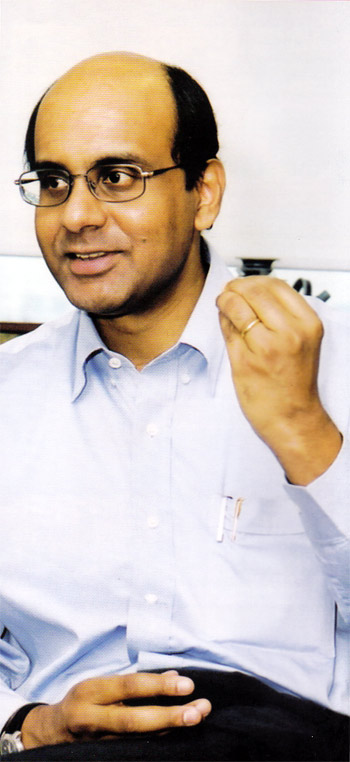 In
school, Mr Tharman Shanmugaratnam
excelled in sports. He represented ACS in several sports
- hockey, football, athletics and cricket, and played
for Combined Schools in hockey. In fact, he would have
gone further in sports and done the school proud if not
for an illness that curtailed his sporting activities
and progress at the age of 17. In
school, Mr Tharman Shanmugaratnam
excelled in sports. He represented ACS in several sports
- hockey, football, athletics and cricket, and played
for Combined Schools in hockey. In fact, he would have
gone further in sports and done the school proud if not
for an illness that curtailed his sporting activities
and progress at the age of 17.
However, Mr Tharman's passion for sports was not in
vain. He feels that it was on the sports field that many
in his generation developed the sense of 'teamsmanship'
and determination that make the difference in life. It
must have helped steer him through his illustrious
career, becoming Managing Director of the Monetary
Authority of Singapre, before entering politics and
taking on his present challenge as Senior Minister of
State for Trade & Industry as well as Education.
To find out what makes this outstanding ACSian tick, ACS
(Independent) students Darren Lim,
Jeremy Au and Ivan Khoo
dropped in at his office for a chat recently. The
following is a summary of what the affable and
unassuming Mr Tharman shared with them.
Please share with us your experiences,
aspirations and achievements when you were a student at
ACS.
"I basically enjoyed my years at ACS.
Sports wasmy consuming passion. I simply relished it,
every practice session, every match, and the company,
the friendships that we formed on the field. I would
play some game almost every day, usually on the old
school field at Barker Road. we would often continue
until it was too dark to see the ball, and then adjourn
for drinks at the Lim Poh San Coffeeshop that used to be
across the road - I mean soft drinks! If we played at
Farrer Park, we would adjourn tothe hawker stalls that
used to be at Northumberland Road. Unfortunately for me,
serious sports ended early as I developed an illness at
17 that affected me for a few years. But the playing
field is still what gives me my fondest memories of my
youth.
I think sport develops a natural sense of teamsmanship.
It's a natural integrating activity, bringing together
people from different social backgrounds and races, and
different schools. It also develops certain emotional
characteristics,which are useful in life. In sports, you
don't always win! So you learn how to take losing after
having trained the whole year, and go on to train harder
for the next season. You don't hink very much about it
at that stage, about the lessons or how it's developing
you, but later on in life when you reflect on things you
realise how sports develops you, emotionally and
socially. The same holds for other forms of CCA, in
their own way. Anything that you take to with
enthusiasm and dedication, and especially team
endeavours, I think a lot comes out of it. I see that as
a very valuable part of my education".
Were there any special people or memorable
incidents in school that helped to shape your life?
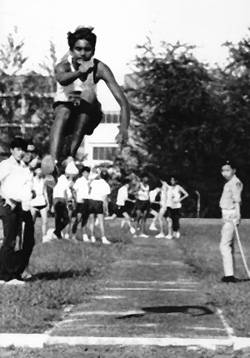 "Certain
individuals make a mark onyou, sometimes without your
realising at the time. We had some very good teachers.
The teacher whom I remember most vividly was my form
teacher in Pre U 2, Mr Wan Fook Weng,
who taught us Pure Mathematics. He clearly enjoyed what
he was doing. He had a real passion for mathematics and
taught it in his own, inimitable style. He disliked
giving answers. He would usually pose a question, wlak
out of the class, then come back and ask "so"?
It forced us to think. I enjoyed his classes and took a
conceptual approach to the subject. It made the subject
much more interesting. He was a tough taskmaster in his
own way, not in the sense of setting tough question and
demanding that we work them out. And he peppered his
teaching with a lot of advice on matters that had
nothing to do with mathematics. "Certain
individuals make a mark onyou, sometimes without your
realising at the time. We had some very good teachers.
The teacher whom I remember most vividly was my form
teacher in Pre U 2, Mr Wan Fook Weng,
who taught us Pure Mathematics. He clearly enjoyed what
he was doing. He had a real passion for mathematics and
taught it in his own, inimitable style. He disliked
giving answers. He would usually pose a question, wlak
out of the class, then come back and ask "so"?
It forced us to think. I enjoyed his classes and took a
conceptual approach to the subject. It made the subject
much more interesting. He was a tough taskmaster in his
own way, not in the sense of setting tough question and
demanding that we work them out. And he peppered his
teaching with a lot of advice on matters that had
nothing to do with mathematics.
There were other teachers who clearly enjoyed the
subjects they taught. In Literature for example, we had
Mrs Lee Gek Kim, and in Additional
Mathematics Mrs Lee Tzu Hong. they had
a passion for teaching their subjects. When a teacher
shows an intrinsic interest in the subject, it infects
the students. They find learning more enlivened, more
engaging. Not every student is made out to be a
Literature enthusiast, but even those who are not
can at least appreciate something of the flavour of the
subject if they have a good teacher."
Are there lessons in life you have learnt
which have contributed to your illustrious career?
"That's
a heavy question! Going back to sports - not that I want
to overdo the point - there's a certain perspective that
you develop, which I think is useful in life. An ability
to take success without getting to your head, and to
take failure will - to pick yourself up and move on. It
also develops a certain respect for others. Every team
has people with very different strengths and weaknesses,
and when you spend much of the year working with the
team so that you can maximise its strengths and minimise
weaknesses, it rubs off on you in other ways."
What made you enter politics?
"I did not think about it in school, but began to take
an interest in social issues when I was in NS and during
my university days. I started reding quite widely. After
university, I concentrated on my job andon getting a
better, practical understanding of Singapore, the
challenges we face. If you want tobe serious about
contributing in any way in politics, you have to
understand the situation quite well.
When I finally decided to go into politics, it was not
something I felt was foreign to me. I think at the end
of the day, you take greatest satisfaction in what you
can contribute to a larger group of people, be it a
community or a country."
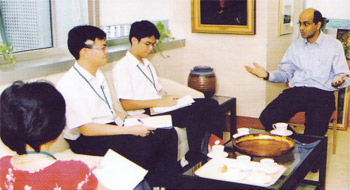 You wear the dual hats of the Ministry of
Trade & Industry and Education. How do you manage to
juggle the diverse responsibilities? You wear the dual hats of the Ministry of
Trade & Industry and Education. How do you manage to
juggle the diverse responsibilities?
"It's not as difficult as it seems. The main thing is
not to view yourself as a specialist or an expert. You
have to listen to others who are specialists, those who
really know the subject well. Then your job is basically
to synthesise, to evaluate and to make judgements."
You have fairly young children. Given your
very busy schedule, do you find that you have to 'make'
time to spend with your family"
"Yes. I have to consciously make time for them. I'd like
to spend more time with them, but I don't think I've
sacrificed too much in the quality of family life.
Everyday, I look forward to seeing them. On the way
home, I call the kids to let them know I am coming back,
get a few questions asked .... do I want orange joice,
do I want this ... it's great going back to them every
day."
How do you see education in Singapore
evolving, given the recent changes made?
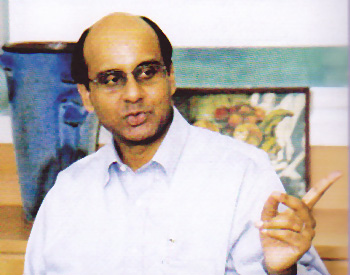 "Well,
there are a few strands to that. We've got a system that
sets high standards, and gets every student to aim high.
I think education is one of Singapore's key strengths.
We are working from that position of strength, to now
free up somewhat, provide more diverse paths and develop
a more innovative climate. "Well,
there are a few strands to that. We've got a system that
sets high standards, and gets every student to aim high.
I think education is one of Singapore's key strengths.
We are working from that position of strength, to now
free up somewhat, provide more diverse paths and develop
a more innovative climate.
We want to recognise different talents andgroom them
along different paths. We need a more diverse set of
Singaporeans in the future, and you can't get a more
diverse set of Singaporean unless you allow them to
pursue different paths of learning and experience. Tha's
one aspect of how we are evolving.
A second point is that, although Singapore's
infrastructure and manpower is more efficient than most
- and this is still an advantage - it is no longer
adequate. We have tobe distinguished ultimately not for
our efficiency, but for our ability to innovate. That
has to be the key characteristic that people associate
with Singaporeans in future - the fact that we create
new products and services, find new ways of doing
things, and translate new ideas into reality. It means
cultivating fromyoung, a willingness to experiment, to
try something different, and if you fail,to try again.
A
third aspect is that we need to groom more experienced
Singaporeans. We need strong, exceptional individuals.
That means identifying talents early and allowing them
togo as far as they can; encouraging students to run
with their passion for a subject or an activity, to
dream the impossible and to work very hard to realise
those dreams. We need more of a spirit of exceptionalism
amongst our young, to take us forward."
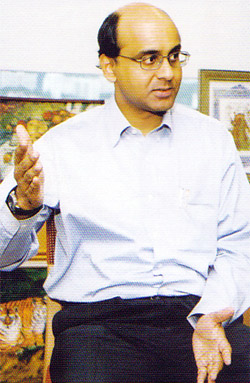 Besides having a stellar performance in
academics and CCA, what makes a school successful? Besides having a stellar performance in
academics and CCA, what makes a school successful?
"It helps to have a respect for diversity in all its
forms - diverse talents, people with diverse strengths,
even diverse characters. Getting everyone to respect
diversity also helps to produce individuals who can fit
easily in society and the workplace. Being able to work
with people from a wide variety of backgrounds, draw on
their strengths, and get along well with them. These
things matter in life, and they are best developed
through the non-academic curriculum. Obviously, schools
have to pay attention to the academic curriculum. But
the best schools achieve a good balance between the
two."
How can parents discipline and encourage
their children to explore and venture into new grounds?
"I think the most basic point is to encourage children
to ask questions from very young. Once they get through
secondary school and become young adults, they should
have developed a certain scepticism towards establised
wisdom, and I don't mean cynicism. Having a questioning
attitude towards established knowledge and even
established ways of doing things, is not a bad habit -
it leads to wanting to find a better way or alternative
solution.
We also need discipline to succeed in creative
endeavour. Innovation is rarely about somebody gettng a
bright spark. It's hard work, persistence, trying and
trying again. So, hard work and dedication matter.
That's a trait of the Singapore education system. People
say it is stressful, and it is a little stressful, but
it is not a bad trait to inculcate in our young.... a
willingness to work hard at whatever you are doin, to
get somewhere."
|